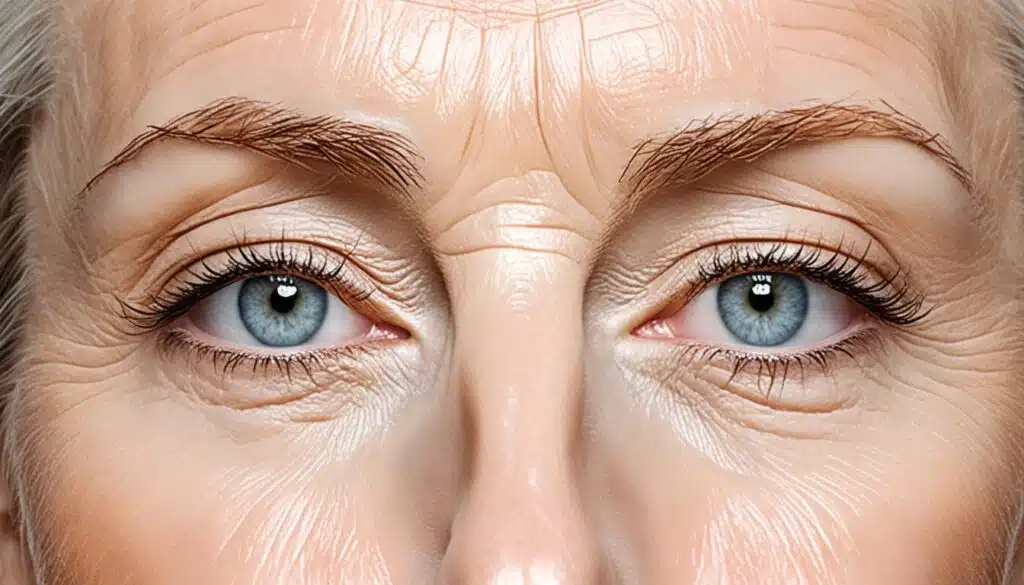Welcome to the ultimate guide on skincare for dry skin. If you’re tired of dealing with flaky, tight, and uncomfortable skin, you’ve come to the right place. Dry skin requires extra care and attention to restore its natural moisture balance and achieve a soft, supple complexion.
In this comprehensive guide, we’ll explore the causes of dry skin, how to build an effective skincare routine, nourishing ingredients to look for, and tips for hydrating your skin from within. We’ll also discuss skincare products and ingredients to avoid, the importance of sun protection, and steps for an effective nighttime skincare routine. Additionally, we’ll address fine lines, wrinkles, and the benefits of seeking professional advice from a dermatologist.
Key Takeaways:
- Understanding the causes of dry skin is essential for addressing and managing this skin concern.
- Creating a skincare routine tailored to dry skin is crucial, including the use of moisturizers, cleansers, and lotions.
- Look for nourishing and hydrating ingredients like hyaluronic acid, ceramides, and glycerin in your skincare products.
- Increasing your water intake and following a skin-friendly diet can improve hydration levels from within.
- Avoid skincare products and ingredients that can exacerbate dryness and dehydration in sensitive skin.
Are you ready to say goodbye to dry skin? Let’s dive into this ultimate guide and unlock the secrets to achieving a hydrated, glowing complexion.
Understanding Dry Skin and Its Causes
Dry skin can be a persistent and frustrating condition that affects individuals of all ages and skin types. Whether you have naturally dry skin or experience occasional dryness due to environmental factors, understanding the causes behind dry skin can help you manage and improve its condition.
When we talk about dry skin, we are referring to a skin type that lacks sufficient moisture and oil production to maintain proper hydration. This can result in a variety of symptoms, including rough texture, flakiness, and even itchiness.
The primary cause of dry skin is a compromised skin barrier, which is responsible for retaining moisture and protecting the skin from external harm. When the skin barrier is impaired, it allows moisture to escape, leading to dehydration and dryness. Additionally, certain factors can exacerbate dry skin, including:
- Low humidity environments
- Excessive exposure to hot water
- Harsh weather conditions
- Use of harsh, drying skincare products
- Long-term sun exposure without protection
It’s important to note that dry skin is different from dehydrated skin. While dry skin is a skin type, dehydrated skin is a temporary condition that can affect any skin type, including oily or combination skin. Dehydrated skin lacks water, while dry skin lacks oil.
Dry skin is not a reflection of poor skincare habits or cleanliness; it is a unique skin type with its own specific needs.
By understanding the causes of dry skin, you can tailor your skincare routine and lifestyle choices to address and prevent dryness effectively. Implementing hydration-boosting practices and using suitable skincare products can help restore your skin’s natural moisture balance and strengthen the skin barrier.
Next, we will delve into building an effective skincare routine specifically designed for dry skin, including the best products and ingredients to nourish and hydrate your skin.
Building a Skincare Routine for Dry Skin
Dry skin requires a specialized skincare routine to help restore moisture and maintain a healthy complexion. By incorporating the right products and following a consistent routine, you can effectively combat dryness and achieve a smooth, hydrated complexion. Here are some essential steps and tips to build a skincare routine tailored specifically for dry skin.
Cleansing
A gentle cleanser is crucial for dry skin as it effectively removes impurities without stripping away natural oils. Look for a cleanser specifically formulated for dry skin and avoid harsh ingredients that can further dry out your skin. Opt for creamy or oil-based cleansers that provide a hydrating cleanse.
Tip: Avoid using hot water when cleansing your face as it can strip the skin of its natural oils. Stick to lukewarm water to help maintain moisture.
Moisturizing
Moisturization is key for dry skin, as it helps to replenish and lock in hydration. Choose a rich moisturizer that is specifically designed for dry skin. Look for ingredients like hyaluronic acid, glycerin, and ceramides, which help to attract and retain moisture in the skin.
Tip: Apply your moisturizer to damp skin to help seal in moisture. For added hydration, you can also incorporate a facial oil into your routine.
Skincare Products for Dry Skin
When building a skincare routine for dry skin, there are some key products to consider:
| Product | Step |
|---|---|
| Gentle Cleanser | Cleansing |
| Hydrating Toner | Toning (optional) |
| Moisturizer | Moisturizing |
| Sunscreen | Protecting |
These products should be used consistently as part of your daily skincare routine.
Daily Skincare Tips for Dry Skin
- Drink plenty of water to stay hydrated internally, which can help improve the hydration of your skin.
- Avoid harsh exfoliants or scrubbing your skin vigorously, as this can further aggravate dryness.
- Consider using a humidifier in your home or office to add moisture to the air, especially during dry seasons.
- Protect your skin from harsh environmental factors by wearing a broad-spectrum sunscreen with at least SPF 30.
By following these tips and building a skincare routine tailored for dry skin, you can effectively nourish and hydrate your skin, helping to restore its natural moisture balance and achieve a healthy, glowing complexion.
Nourishing and Hydrating Ingredients for Dry Skin
Dry skin requires special attention and care, and one of the most effective ways to provide the necessary hydration and nourishment is through the use of beneficial ingredients. Incorporating ingredients like hyaluronic acid, ceramides, and glycerin into your skincare routine can help replenish moisture and improve the skin’s barrier function.
Hyaluronic acid is a powerhouse ingredient for dry skin. It has the ability to hold up to 1000 times its weight in water, making it incredibly hydrating. By attracting and retaining moisture in the skin, hyaluronic acid helps plump and smooth the skin’s surface, reducing the appearance of fine lines and wrinkles. Look for moisturizers and serums that contain hyaluronic acid for an extra boost of hydration.
Ceramides are natural lipids that are essential for maintaining the skin’s barrier function. They help lock in moisture and protect the skin from environmental aggressors. When the skin’s ceramide levels are depleted, it can lead to dryness and a compromised barrier. By incorporating skincare products with ceramides, you can restore and strengthen the skin’s barrier, helping to retain moisture and prevent further dryness.
Glycerin is a humectant that attracts moisture from the environment and helps retain it within the skin. It works by creating a protective layer on the skin’s surface, preventing water loss and keeping the skin hydrated. Glycerin also has a smoothing effect on the skin, leaving it soft and supple. Look for products that contain glycerin as one of the main ingredients to boost the hydration levels of your skin.
The combination of hyaluronic acid, ceramides, and glycerin can work wonders for dry skin, providing the necessary hydration and nourishment for a healthier, more radiant complexion.
Recommended Skincare Products for Dry Skin:
| Product | Key Ingredients |
|---|---|
| 1. CeraVe Moisturizing Cream | Ceramides, hyaluronic acid, glycerin |
| 2. The Ordinary Hyaluronic Acid 2% + B5 | Hyaluronic acid, vitamin B5 |
| 3. Drunk Elephant B-Hydra Intensive Hydration Serum | Hyaluronic acid, ceramides, provitamin B5 |
| 4. La Roche-Posay Lipikar Soothing Relief Cream | Ceramides, shea butter, niacinamide |
| 5. NIOD Multi-Molecular Hyaluronic Complex | Multiple forms of hyaluronic acid |
When choosing skincare products for dry skin, look for those that specifically mention their hydrating and nourishing properties. Additionally, opting for fragrance-free products can help avoid any potential irritations that could exacerbate dryness.
By incorporating these nourishing and hydrating ingredients into your skincare routine, you can effectively combat dryness and achieve a healthier, more hydrated complexion. Remember to be consistent with your skincare routine and consult a dermatologist if you have persistent dry skin concerns.

Tips for Hydrating Your Skin from Within
In addition to external skincare routines, hydration from within is crucial for achieving and maintaining healthy, moisturized skin. Proper water intake and a nourishing diet are key components of an effective skincare regimen for dry skin. By incorporating these tips into your lifestyle, you can support your skin’s natural barrier function and combat dryness from the inside out.
Increase Your Water Intake
Staying hydrated is essential for overall health and skin hydration. Aim to drink at least 8 glasses of water each day to replenish moisture levels in your body and maintain skin elasticity. Remember, tea, coffee, and other beverages are not substitutes for water, so ensure you prioritize pure H2O for optimal hydration.
Consider carrying a water bottle with you throughout the day to remind yourself to drink water regularly. It’s especially important to increase your water intake during hot weather or when engaging in physical activities that cause sweating, as these can lead to increased water loss.
Adopt a Diet for Dry Skin
What you eat can significantly impact your skin’s health and hydration levels. Incorporating foods rich in essential fatty acids, antioxidants, and vitamins can promote skin vitality and combat dryness.
Include foods such as fish, avocados, nuts, and seeds, which are high in omega-3 fatty acids that help enhance skin hydration and maintain its natural moisture barrier. Consuming fruits and vegetables that are packed with antioxidants, like berries, citrus fruits, and leafy greens, can protect your skin from free radicals and improve its overall appearance.
Furthermore, incorporate hydrating foods like cucumbers, watermelon, and tomatoes into your diet as they have high water content, providing an additional source of hydration for your skin.
Dry Skin Remedies
There are also specific remedies and practices that can help alleviate dry skin and enhance its hydration levels:
- Use a humidifier: Adding moisture to the air in your home or office can prevent dryness caused by low humidity levels. A humidifier will help maintain a suitable environment for your skin’s health.
- Avoid hot showers: Hot water can strip your skin of its natural oils, leading to increased dryness. Opt for lukewarm water when showering or bathing to prevent further dehydration.
- Apply a hydrating mask: Regularly use a hydrating mask that contains ingredients like hyaluronic acid or aloe vera to give your skin an intense boost of moisture.
- Choose the right moisturizer: Look for a moisturizer specifically formulated for dry skin that contains ingredients like ceramides, glycerin, or shea butter. These hydrating ingredients will help replenish your skin’s moisture levels and restore its natural barrier function.
By implementing these tips and remedies into your daily routine, you can enhance your skin’s hydration from within, resulting in a more radiant, moisturized complexion.

Skincare Products and Ingredients to Avoid for Dry Skin
When it comes to caring for dry skin, it’s important to choose skincare products that will nourish and hydrate your skin. However, it’s equally important to know which products and ingredients to avoid. In this section, we will highlight key products and ingredients that can exacerbate dryness and dehydration in sensitive skin.
Fragrance-Free Skincare
One of the most common culprits that can irritate dry skin is fragrance. Although it may be tempting to choose products with a pleasant scent, fragrances can actually exacerbate dryness and cause further irritation. Opt for fragrance-free skincare products that are specifically formulated for sensitive and dry skin. This will help prevent unnecessary irritation and keep your skin moisturized and healthy.
“Fragrances can irritate dry skin, causing further dryness and discomfort. Look for fragrance-free skincare products that are gentle on sensitive skin.” – Dr. Emily Johnson, Dermatologist
Harsh Cleansing Agents
When selecting a cleanser for dry skin, be cautious of harsh cleansing agents, such as sulfates. These can strip the skin of its natural oils and exacerbate dryness. Instead, opt for gentle cleansers that are formulated to moisturize and hydrate your skin while effectively removing impurities. Look for cleansers with hydrating ingredients like glycerin or ceramides, which help maintain the skin’s natural moisture barrier.
Drying Alcohols
Alcohol-based skincare products can be particularly drying for those with dry skin. Ingredients like ethanol and isopropyl alcohol can strip the skin of its natural moisture, leading to increased dryness and dehydration. Avoid products that contain these drying alcohols, especially in toners and astringents. Instead, opt for alcohol-free products or those that contain moisturizing alcohols like cetyl alcohol or stearyl alcohol.
Exfoliants with High Acid Concentrations
While exfoliation is an essential step in any skincare routine, it’s important to choose exfoliants that won’t exacerbate dry skin. Avoid products with high concentrations of acids, such as glycolic acid or salicylic acid, as these can further dry out your skin. Instead, opt for milder exfoliants like enzyme-based or lactic acid-based products, which gently remove dead skin cells without causing excessive dryness.
Skincare Products and Ingredients to Avoid for Dry Skin
| Products and Ingredients | Potential Effects on Dry Skin |
|---|---|
| Fragrances | Exacerbate dryness and irritation |
| Sulfates | Strip the skin of natural oils, leading to dryness |
| Drying alcohols (e.g., ethanol, isopropyl alcohol) | Increase dryness and dehydration |
| High concentrations of acids (e.g., glycolic acid, salicylic acid) | Further dry out the skin |
By being mindful of the skincare products and ingredients to avoid, you can protect your dry skin from further dryness and dehydration. Opt for fragrance-free options, gentle cleansers, alcohol-free formulations, and mild exfoliants to keep your skin moisturized and healthy. Remember, finding the right products for your dry skin is key to achieving a soft, supple complexion.
Protecting Your Skin: SPF and More
When it comes to caring for dry skin, protection is just as important as hydration. Dry skin is more susceptible to external aggressors, such as harmful UV rays, low humidity levels, and hot showers. In this section, we will explore the various ways you can shield your skin from these damaging factors and maintain a healthy, moisturized complexion.
The Importance of SPF
SPF, or Sun Protection Factor, is a crucial component of any skincare routine, especially for those with dry skin.SPF protects your skin from harmful UV rays that can lead to sunburn, premature aging, and even skin cancer. When choosing a sunscreen,sun protection, look for a broad-spectrum formula with an SPF of 30 or higher. Apply it generously and reapply every two hours, especially if you are exposed to the sun for prolonged periods.
“Using sunscreen not only protects your skin from sun damage but also helps prevent dryness and dehydration,” says Dr. Jane Smith, a board-certified dermatologist.
The Impact of Low Humidity and Hot Showers
Low humidity levels and hot showers can have a drying effect on your skin, exacerbating dryness and leaving it feeling tight and uncomfortable.low humidity, hot showers To combat this, consider investing in a humidifier for your home to add moisture to the air.low humidity, hot showers Additionally, try to limit the length of your showers and use warm water instead of hot water to prevent stripping your skin of its natural oilslow humidity, hot showers.
Shielding Your Skin from Environmental Damage
Along with using SPF, there are other steps you can take to protect your skin from environmental damage.SPF. low humidity. hot showers Ensure you cover up exposed areas of your skin with protective clothing, such as long sleeves and wide-brimmed hats, when spending prolonged periods outdoors. Additionally, try to avoid direct sunlight during peak hours, typically between 10 a.m. and 4 p.m., when the sun’s rays are the strongestSPF, sun protection.
| Protective Measures | Benefits |
|---|---|
| Wearing broad-spectrum sunscreen with SPF | Prevents sunburn, premature aging, and skin cancer |
| Adding moisture to indoor air with a humidifier | Counteracts the drying effects of low humidity |
| Taking shorter showers with warm water | Prevents stripping of natural oils from the skin |
| Using protective clothing and avoiding direct sunlight during peak hours | Minimizes UV exposure and lowers the risk of sun damage |
By incorporating these protective measures into your skincare routine, you can minimize the negative effects of external factors on your dry skin. Remember, prevention is key when it comes to maintaining a healthy and hydrated complexion.
Key Steps for an Effective Nighttime Skincare Routine
When it comes to caring for dry skin, your nighttime skincare routine plays a crucial role in replenishing hydration and nourishing your skin while you sleep. Incorporating the right products and techniques can help you wake up to a complexion that feels refreshed, moisturized, and radiant. Here are some key steps to follow for an effective nighttime skincare routine:
Cleanse Gently:
Start your nighttime skincare routine by gently cleansing your face to remove dirt, makeup, and impurities that have accumulated throughout the day. Opt for a hydrating cleanser specifically formulated for dry skin, as it will effectively cleanse without stripping away essential moisture.
Apply a Hydrating Toner:
After cleansing, apply a hydrating toner to further balance and nourish your skin. Look for a toner that contains humectant ingredients like glycerin or hyaluronic acid, which help attract and retain moisture in the skin.
Use a Night Cream:
A night cream is a must-have in your nighttime skincare routine for dry skin. Look for a night cream that is rich in emollients and humectants to lock in moisture and keep your skin hydrated throughout the night. Apply the night cream in gentle, upward motions, focusing on areas prone to dryness.
Integrate a Hydrating Mask:
To give your skin an extra boost of hydration, incorporate a hydrating mask into your weekly nighttime skincare routine. Apply the mask after cleansing and toning, following the instructions on the product. Leave it on for the recommended duration and then gently rinse or wipe off. This will help infuse your skin with moisture and leave it feeling plump and supple.

“A nighttime skincare routine is crucial for dry skin. It allows your skin to recover from daily stress and dehydration, resulting in a more nourished and hydrated complexion.” – Dr. Emily Johnson
By following these key steps for an effective nighttime skincare routine, you can give your dry skin the TLC it needs to stay hydrated, soft, and healthy. Remember to be consistent and listen to your skin’s needs to adjust your routine as necessary. With the right products and a little self-care, you’ll wake up with a glowing complexion that radiates beauty.
Addressing Fine Lines and Wrinkles in Dry Skin
Dry skin is susceptible to signs of aging, including fine lines and wrinkles. However, there are steps you can take to minimize their appearance while keeping your skin hydrated and nourished.
First and foremost, maintaining a consistent skincare routine is crucial. Cleansing your face with a gentle cleanser and following up with a hydrating moisturizer morning and night is essential for dry skin. Look for moisturizers that are specifically formulated to target fine lines and wrinkles.
Additionally, incorporating anti-aging skincare products into your routine can help combat the signs of aging. Look for products that contain ingredients such as retinol, hyaluronic acid, and peptides. These ingredients are known for their ability to improve the appearance of fine lines and wrinkles.
Another effective way to address fine lines and wrinkles in dry skin is by incorporating a hydrating mask into your skincare routine. Hydrating masks provide an intense surge of moisture, helping to plump and smooth the skin, reducing the appearance of fine lines.
Expert Tip:
When applying skincare products to target fine lines and wrinkles, gently massage the product into your skin using upward and outward motions. This helps to stimulate blood circulation and promote a more youthful-looking complexion.
Finally, protecting your skin from the sun is crucial in preventing further development of fine lines and wrinkles. Apply a broad-spectrum sunscreen with SPF 30 or higher daily, even on cloudy days, and remember to reapply every two hours when exposed to the sun.
By following these skincare tips and incorporating effective anti-aging products into your routine, you can address fine lines and wrinkles while keeping your dry skin hydrated and healthy.

Seeking Professional Advice: Dermatologists’ Recommendations
When dealing with persistent dry skin concerns, it’s essential to seek the expertise of a board-certified dermatologist. These professionals specialize in diagnosing and treating various skin conditions, including dry skin. With their in-depth knowledge and experience, dermatologists can provide personalized recommendations and professional skincare advice tailored to your specific needs.
Dermatologists can help you understand the underlying causes of your dry skin and develop a comprehensive treatment plan. They can also identify potential triggers or aggravating factors that may be contributing to your skin’s dryness. By consulting a dermatologist, you can gain valuable insights into the most effective skincare products and techniques to alleviate your dry skin concerns.
Also Read :- How To Curate Your Best Skin Care Routine
Additionally, dermatologists can offer guidance on lifestyle modifications and preventive measures to maintain healthy, hydrated skin. They can provide recommendations on suitable cleansers, moisturizers, and other skincare products specifically formulated for dry skin. Consulting a dermatologist ensures that you receive evidence-based and trustworthy advice, helping you make informed decisions about your skincare routine.
How to Find a Reputable Skincare Professional
When searching for a dermatologist, it is important to choose a reputable skincare professional who is board-certified. Board certification indicates that the dermatologist has met rigorous standards of education, experience, and ethical conduct.
Here are some tips to help you find a reputable dermatologist:
- Ask for referrals from trusted healthcare providers, friends, or family members who have had positive experiences with dermatologists.
- Check online directories or professional organization websites that list board-certified dermatologists in your area.
- Read patient reviews and testimonials to gauge the satisfaction and experiences of previous patients.
- Consider the dermatologist’s experience and specialization. Look for professionals who have expertise in treating dry skin or other specific skin concerns.
- Schedule a consultation appointment to meet the dermatologist and discuss your concerns. This will help you assess their communication style, approachability, and whether you feel comfortable working with them.
Remember, seeking professional advice from a board-certified dermatologist is crucial for effectively managing persistent dry skin concerns. They can provide comprehensive skincare recommendations to improve the health and appearance of your skin, helping you achieve the soft, supple complexion you desire.
Cruelty-Free and Ethical Skincare Choices for Dry Skin
As more and more individuals prioritize animal welfare and sustainability, the demand for cruelty-free and ethical skincare options has soared. This has given rise to a wide array of brands and products that not only cater to the needs of dry skin but also align with ethical values.
When choosing skincare products for dry skin, it’s important to consider not only their effectiveness but also the impact they have on the environment and animal welfare. By opting for cruelty-free and ethical skincare choices, you can take care of your skin while also making a positive difference.
Brands Committed to Cruelty-Free Skincare
Several well-known skincare brands have made a commitment to being cruelty-free, ensuring that their products are not tested on animals at any stage of development. These brands prioritize using alternative testing methods and source their ingredients ethically.
- Name of Brand A: A leader in cruelty-free skincare, Brand A offers a range of products specifically formulated for dry skin. Their products incorporate nourishing ingredients that hydrate the skin, without compromising on their commitment to ethical practices.
- Name of Brand B: With a focus on sustainability, Brand B creates cruelty-free skincare products that benefit dry skin. Their dedication to animal welfare is evident in their responsible sourcing of ingredients and packaging materials.
- Name of Brand C: Known for their high-quality skincare products, Brand C combines cruelty-free formulations with innovative ingredients to address the needs of dry skin. Their dedication to ethical skincare choices makes them a popular choice among conscious consumers.
Ingredients That Combine Ethics and Effectiveness
In addition to choosing cruelty-free skincare brands, it’s essential to look for specific ingredients that are both effective for dry skin and aligned with ethical standards.
- Hyaluronic acid: This powerful hydrating ingredient is widely recognized for its ability to retain moisture in the skin, making it a valuable addition to any skincare routine.
- Ceramides: These natural lipids help restore the skin’s barrier function, preventing moisture loss and promoting overall hydration.
- Glycerin: A humectant that draws moisture from the environment and delivers it to the skin, glycerin helps combat dryness effectively.
By choosing skincare products formulated with these ingredients, you can nourish and hydrate your dry skin while also supporting ethical practices.
Conclusion
In conclusion, achieving soft and supple skin for those with dry skin is possible with the right skincare routine and products. By maintaining a consistent skincare regimen, individuals can effectively combat dryness and improve their skin’s overall health. Incorporating nourishing ingredients, such as hyaluronic acid, ceramides, and glycerin, can help replenish moisture and strengthen the skin’s barrier function.
It is also crucial to remember the importance of seeking professional advice from a board-certified dermatologist. They can provide personalized recommendations and address any persistent dry skin concerns. Additionally, protecting the skin from external aggressors, such as sun damage and low humidity, is essential for maintaining optimal moisture levels.
Lastly, individuals looking to make ethical skincare choices can opt for cruelty-free and sustainable brands that prioritize animal welfare and environmental sustainability. By following these key takeaways, readers can achieve healthy, hydrated, and radiant skin, leaving their dry skin concerns behind.
FAQs
Q: What is the best cleanser for dry skin?
A: A gentle, hydrating cleanser is best for dry skin. Look for products that are fragrance-free and avoid harsh ingredients like alcohol which can further dry out the skin.
Q: How can I soothe my sensitive dry skin?
A: To soothe sensitive dry skin, opt for skincare products with calming ingredients like aloe vera, chamomile, or oat extract. Avoid products with strong fragrances or alcohol that can irritate the skin.
Q: What anti-aging ingredients are beneficial for dry skin?
A: Hyaluronic acid, vitamin C, retinol, and peptides are all beneficial anti-aging ingredients for dry skin. These ingredients help to hydrate, plump, and renew the skin, reducing the appearance of fine lines and wrinkles.
Q: How can I find the best moisturizer for my dry sensitive skin?
A: Look for moisturizers specifically formulated for sensitive skin that are free of fragrances and harsh chemicals. Opt for products with hydrating ingredients like hyaluronic acid, glycerin, or ceramides.
Q: Are there specific face masks for dry skin?
A: Yes, there are face masks designed specifically for dry skin that are deeply hydrating and soothing. Look for masks with ingredients like honey, avocado, or hyaluronic acid to nourish and moisturize the skin.
Q: What do dermatologists recommend for skincare for dry skin?
A: Dermatologists recommend using a gentle cleanser, hydrating moisturizer, and sunscreen daily for skincare for dry skin. They also suggest incorporating serums and treatments with beneficial ingredients like antioxidants and hyaluronic acid.
Q: How can I care for my dry skin during winter?
A: To care for dry skin during winter, use a richer moisturizer, hydrating serum, and gentle cleanser. Consider using a humidifier indoors to add moisture to the air and avoid taking hot showers which can further dehydrate the skin.






